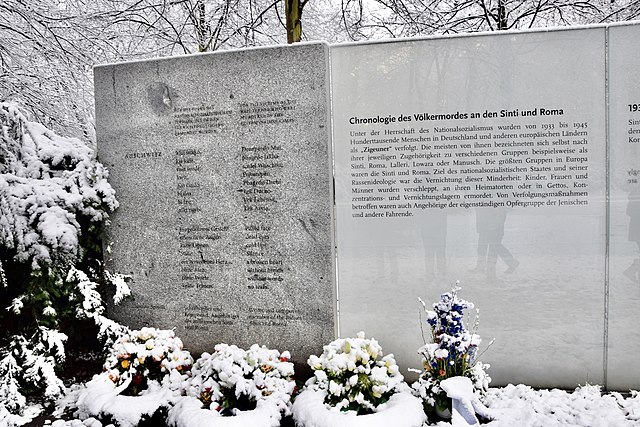To:
Joe Chialo, Berlin Senator for Culture and Community
Manja Schreiner, Berlin Senator for Mobility, Transport, Climate Protection and the Environment
The memorial to the Sinti and Roma of Europe murdered under National Socialism in Berlin is in imminent danger. Deutsche Bahn is putting pressure on the Berlin Senate to approve a new S-Bahn line directly under the memorial.
For the so-called S21, old trees on a large scale would have to give way, which are central to Dani Karavan’s artistic vision. Without these trees, the unique atmosphere and tranquility of the memorial site between the Reichstag building and the Brandenburg Gate would be permanently destroyed.
For the Sinti and Roma minority, the memorial is a sensitive place of remembrance of the victims’ suffering and their own loss – a symbolic grave.
“My father, my mother, my sisters and my little brother were murdered in Nazi extermination camps and have no grave where I could go and lay flowers. A place where I can stand still and be with them in my thoughts. That is a great loss. I considered this memorial to be my family’s grave. […] I call on those who are planning the route of the new S-Bahn to take into account the wishes of the Sinti and Roma community in Germany and beyond. The only good solution is an alternative route so that our monument is not damaged and peace is guaranteed. […] Leave our monument untouched so that our dead may find their eternal rest.”
Thus spoke Zoni Weisz in 2021, who as a child survived the genocide of the Sinti and Roma in the Netherlands and lost his entire family.
With the memorial, the Federal Republic of Germany symbolically acknowledges its responsibility for the crimes committed against the Sinti and Roma. Its erection in the heart of Berlin is a centerpiece of historical and political responsibility in the present, in Germany as well as in Europe, a memorial against forgetting. The genocide was only recognized in the Federal Republic of Germany in 1982, and it took thirty more years of political struggle before the memorial could be inaugurated in 2012 – 67 years after the end of the Second World War and 20 years after the first declaration of intent by the federal government to erect such a memorial.
In the summer of 2020, the public and the members of the Sinti and Roma minority learned through the press about the planned construction of the S21 suburban railway line and the associated encroachment on the memorial.
After numerous protests and negotiations, the “variant 12h” was finally presented as a “compromise proposal”. But this too entails the felling of a large part of the surrounding trees and thus the destruction of the overall work of art. Israeli architect Dani Karavan, creator of the memorial, said before his death in May 2021:
“The trees are an integral part of the memorial and a crucial element of the atmosphere I wanted to create. If the trees are altered in any way, the clearing will lose its features and the unique atmosphere of the memorial will be damaged. Any change to the trees would destroy the memorial’s seclusion from the city and drastically affect its function as a place for contemplation and meditation.“
The Foundation Memorial to the Murdered Jews of Europe, which is also responsible for the Memorial to the Sinti and Roma of Europe Murdered under National Socialism, states that with “variant 12h” it would no longer be able to ensure its legal mandate, the remembrance of the murdered Sinti and Roma of Europe and their appreciation, in a suitable manner.
The Berlin government now wants to press ahead with the construction plans. With only a week’s notice, representatives of Sinti and Roma NGOs, Noa Karavan, daughter of Dani Karavan, and the Monument Foundation were invited to a meeting on 28 September. By 13 October, “concrete proposals for improvements to the present proposal (construction variant 12h)” are to be submitted. The Berlin Senate’s goal is a “rapid commitment to variant 12h in order to avoid ongoing costs and estimated construction cost increases in the millions”. Alternative routes that would leave the memorial to the Sinti and Roma untouched are no longer being considered for cost reasons.
Are we allowing the interests of Deutsche Bahn, legal successor to the Deutsche Reichsbahn, which transported the victims to the concentration and extermination camps, to destroy the memory of the dead?
We the undersigned and the majority of the Sinti and Roma reject the proposal!
It irrevocably destroys the memorial to the murdered Sinti and Roma of Europe.
It dishonors the victims, the survivors and their descendants.
It fundamentally attacks the commitment of German society to the memory of past crimes.
It is not the task of the affected minority to look for alternative solutions for variant 12h, but the moral and political obligation of all Germans to stand up for the integrity of the monument.
We call on the Berlin Senate not to take any further steps until a route is found that leaves the monument untouched in its entirety.
First signatories:
- Hava Karavan, Wife of Dani Karavan
- Noa Karavan-Cohen, Daughter of Dani Karavan
- Tamar Karavan, Daughter of Dani Karavan
- Yael Karavan, Daughter of Dani Karavan
- Hamze Bytyçi, Chairman of RomaTrial e.V.
- Romeo Franz, Member of the European Parliament
- Uwe Neumärker, Director of the Foundation Memorial to the Murdered Jews of Europe
- Alexandra Senfft, Writer
- Daniel Strauß, Director of RomnoKher
This is a republication of the letter. You can see the original and the full list of signatories here.



